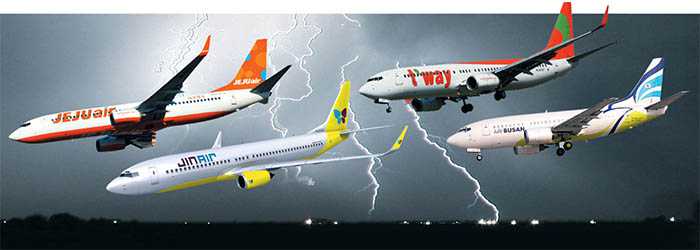Budget Airlines on Edge of Collapse
26 May, 2021

Low-cost carriers found in Korea happen to be teetering on the advantage of collapse while losses mount because of the coronavirus pandemic.
Flag carriers Korean Air flow and Asiana Airlines are actually managing to make up for losses found in passenger transfer by hauling even more cargo, but finances airlines rely heavily on flying people.
"We've performed everything we are able to including capital rises and loans while our resources have already been depleted," a funds airline executive stated. "If the problem doesn't progress soon, we will have bankruptcies."
Top-ranked Jeju Air suffered an functioning loss of W85.9 billion in the first quarter of the year, while Jin Air's operating damage totaled W60 billion, T'way Air's W44.8 billion and Air Busan's W47.2 billion (US$1=W1,123). That brings their merged losses to W237.9 billion.
Jin Air's debt-to-equity ratio stands at a perilous 1,793.4 percent, as the ratio is 1,745.7 percent at Air Busan, 922.1 percent at T'way Air and 681.5 percent at Jeju Air. T'way Oxygen undertook an W80-billion capital increase last month and could gain some breathing area, nonetheless it could sink into capital impairment if the problem continues.
Low-price carriers can only just fly low-margin domestic routes since international flights had been blocked. Previous month, 2.98 million people took household flights, up 147.8 percent on-year, but intensive competition forced them to slash ticket rates.
"We're struggling to attract domestic passengers and selling tickets to Jeju Island for the price of a cup of coffee, which ends up costing us," an airline staffer said. "Given that mid to long-haul flights continue to be shut, it'll be unattainable for us to attain a turnaround."
Carriers are even removing airplanes to spend less. Jeju Surroundings reduced the amount of its aircraft from 44 to 41, and Jin Air flow offered five airplanes to cut its fleet to 23. Weather Busan marketed four airplanes in the 4th quarter of this past year and T'way Weather one.
Staff fear they may end up appearing furloughed without pay. "Until now, we could actually receive 70 percent of our wages as the federal government covers a number of them, but which will shrink if this example continues," one staffer explained.
Carriers are actually asking the government to increase support from 180 days a year to 240 times. At the moment, around 9,000 persons have employment with budget carriers here, and sector insiders say federal government support is the only solution at the moment to continue to keep them afloat.
Hurr Hee-young in Korea Aerospace University said, "The federal government pledged around W200 billion in support financing in March, but I don't believe it has even started assessing how big is losses. This crisis didn't stem from faulty control but was because of external causes, so the government must develop special measures to safeguard the carriers and their staff."
Source:
